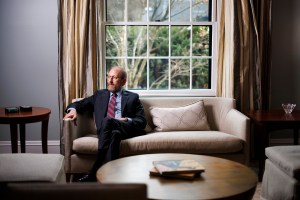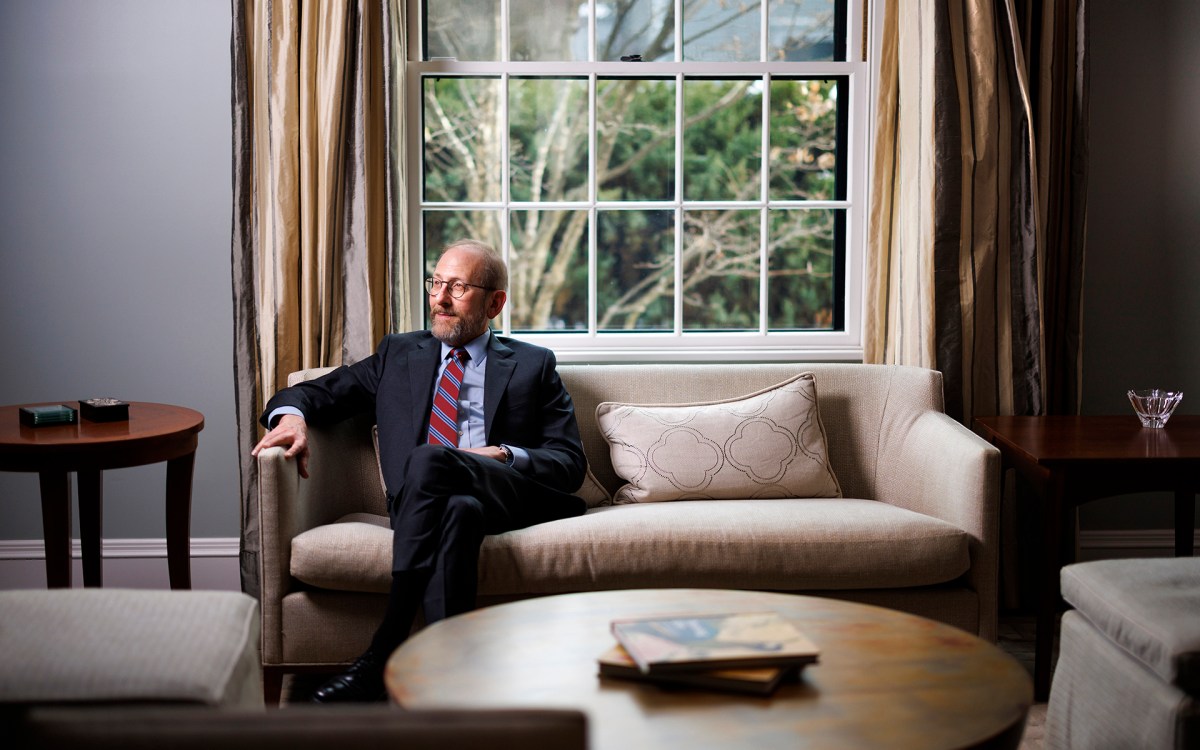Laying down the law: Zittrain wants to bring order to the Wild Wild Web
You might say Jonathan Zittrain was way ahead of his time. When the recently appointed assistant professor of law at Harvard Law School (HLS) was all of 12 years old and most of his friends were whiling away their summer days riding their bicycles or playing baseball, young Jonathan was hammering away on the keyboard of his new $200 J.C. Penney computer.
Zittrain knew then what many of us are just learning now: that the personal computer, with all of its applications and implications, would profoundly shape and affect our society like nothing ever before.
“It was pretty state of the art at the time,” Zittrain says of his first computer. “I totally loved it.”
He spent many hours learning to write code, the building blocks for computer programs. Later, he authored a computer bulletin board system. Soon after, Zittrain signed with a fledgling network system called CompuServe, opening the door to a myriad of opportunities that would eventually take him from Pittsburgh to Harvard, where he is completing a three-year stint as executive director of the Berkman Center for Internet & Society at HLS.
“I’m still sort of amazed at how things have turned out,” Zittrain reflects.
Indeed, it’s been a wild ride for both Zittrain and the Berkman Center. Starting out with a small staff and only a handful of interested students in 1997, the two-room laboratory has expanded and evolved into an eminent research powerhouse, synthesizing the work of faculty, fellows, students, and affiliates on a wide range of Internet issues.
“If there’s any unifying theme to what we’re doing, it’s that we’re trying to look at the evolution of the Internet itself, figuring that some of the stuff that seems abstruse and difficult to understand forms the foundation of the laws now in place,” Zittrain explains.
“Cyberlaw,” according to Zittrain, is the term given to those constraints that encourage some behaviors while preventing others in the digital world. It can take the form of traditional law in some cases, he says, but is more often defined by the “technical architecture” of the Internet designed by software engineers who most often toil away behind the scenes. The architecture determines how Net surfers interact with Websites.
“We [at the Berkman Center] have been trying to look at the underlying technical architecture in a number of areas — how the governance of that code works, how the way the code is articulated affects education, how it affects the application of law, and how it affects content as well.”
In addition to more traditional research, Zittrain advocates active, rather than passive experimentation, echoing the Berkman Center’s declaration that “the best way to understand cyberspace is to actually build out into it.”
Demonstrating that philosophy, the Center has launched interactive Websites designed to facilitate collaborative research initiatives, including the innovative “Open Law” site used for soliciting public input on a variety of ongoing court cases. The Berkman Center also provides the software platform for a series of free online lectures and discussions, and sponsors the Biennial International Conference on Internet & Society at Harvard.
Zittrain relinquishes his role of executive director at the Berkman Center at an especially unsettled time — with the courts determining the fate of Microsoft, with companies like Napster testing the limits of Web freedom, and with the government making more aggressive inroads toward Internet regulation. Each scenario represents the ever-shifting trade winds blowing through this revolutionary new technology. “We’re in the first five years of a 20- to 25-year build out of the net,” Zittrain professes. “To think that things have settled yet is crazy.”
As the build out continues, Zittrain explains, the pressure will increase on Net users and designers to agree to a larger set of common operating standards. “So far we’ve had the ethos of hands off, no regulation, leave it alone, and it will grow,” he says. “I think that’s been a great policy so far, but in the absence of government presence, we will see a number of powerful figures emerge. You’ll get private sheriffs, and they’ll start running their towns however they like, and you can’t throw them out in an election if you don’t like them.”
The potential of a veritable free-for-all on the Internet is a reason for concern, according to Zittrain. “If you don’t set up the boundaries for the national park ahead of time, you just won’t have any parks,” he explains. “Every plot of land is bought and sold. Condos go up and everybody will lament the fact that the park land is all gone.”
For now, at least, there is a sense of anonymity and relative freedom on the World Wide Web, but Zittrain’s vision for the future is more pragmatic. “I see the promise of [the Net] as being what we loosely call ‘the Commons,’ a place where people can share ideas with each other, and build things in an open environment,” he says. “The possible negatives include a world in which, thanks to highly targeted corporate means of knowing who you are when you surf, corporations are able to judge you as a customer, just the way you are judged when you board an airplane and you flash your Premier Gold card. Maybe we can tolerate that on airplanes, but what if it became that way at the hardware store?
“At some point, it becomes a really weird world for which an excess of data about who is who erases some of the de facto egalitarianism that we’ve become used to in daily transactions and commerce.”
Preserving that sense of equal access and fair treatment on the Net will be one of the challenges for Zittrain’s successor as executive director at the Berkman Center — attorney and documentary filmmaker Eric Saltzman, HLS ’72. “In a sense, I think the Berkman Center has been an Internet start-up of sorts,” Zittrain says. “It’s now time for our second round of financing, our retrenching, and I’m delighted there’s somebody who’s fresh and new and ready to take it on.”
Zittrain won’t be going far, of course. He’ll be teaching first-year torts and an Internet and society course at HLS. “It will be good to switch gears a little bit. I’m really looking forward to greeting the first-years when they’re still so excited to be here, and digging deep into Net research,” he remarks.
In addition to his instructional duties, Zittrain will serve as faculty co-director of the Berkman Center, allowing him to remain intimately involved in the institution he helped create and guide for the past three years. One gets the impression that this one-time wonder kid who spent his teenage years exploring the “technical architecture” that helped shape the Internet very much wants to keep the flame burning for the next generation of cyber-pioneers.
“Right now we’re having our first major batch of students who came to Harvard Law for the purpose, among other things, of being at the Berkman Center,” Zittrain explains, “And we want to offer an experience for those students that will be up to their expectations, and make the most of the energy that they’ll be giving, to really put it to good use.”




